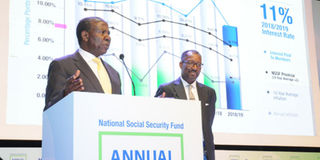When you get 20% of your NSSF...What happens?

Finance Minister Matia Kasaija and NSSF managing director Richard Byarugaba declare the interest for NSSF savers last year. PHOTO/FILE
20, NSSF, What happens?
Workers contributing to the National Social Security Fund will have 20% mid-term access to their benefits. The beneficiary must have saved for at least 10 years and attained the age of 45, Racheal Nabisubi writes.
Members of Parliament on the Gender, Labour and Social Development and the Finance committees have agreed to a revision in the current National Social Security Fund (NSSF) Amendment Bill 2019 that allows qualifying NSSF members mid-term access of up to 20 per cent of their savings.
But for one to qualify for the mid-term access, that member should have saved with the Fund for more than 10 years and attained the age of 45.
The Bill has attracted a lot of debate on whether people should access their savings or not.
In regard to the amendment, NSSF managing director Richard Byarugaba, wrote a letter to NSSF members explaining how NSSF was ready and willing to pay qualifying members, provided a supporting law- the NSSF Amendment Bill in Parliament was passed.
Mr Byarugaba noted that the current legislation, NSSF Act Cap 222, which governs the Fund’s operations does not provide for mid-term benefits and regrettably has limited its ability to offer members new benefits.
But when you get 20 per cent of your NSSF money mid-term, what happens?
Mr Alfred Musamali, a recently retired public servant in his early 60s, says he has no problem with people having earlier access to their money because “We do not have common plans and common challenges.”
“I got the money when I turned 55 years. By then, it had earned me good interest yet I still had some five more years in the public service,” Mr Musamali recalls.
He used some of the money to begin a consultancy and the rest to complete his metropolitan home.
He explains :“I now live in the home but the business has gone through many challenges, including an eviction from the registered head office by a landlady during family wrangles over who should receive/control the rent. The death of my daughter who was managing director, tax compliance also took its toll and the unpredictability brought by Covid-19. So, technically, I have lost the business.”
However, Mr Musamali is one of the lucky few who are still working. He has learnt lessons he can use to improve his operations next time.
But he notes that this would not be possible if it had come at the end of his working life, thus the need for mid-term access.
Mr Musamali says: “If I had access to the money much earlier, each time I encountered financial constraints, it would not have accumulated to the amount I got when I turned 55 and I would probably not have had the capital to invest and the spare cash to complete a house which I did not need at the time because I was “squatting” in government quarters.”
He adds: “There ought to be a balance between the advocates of early access and capital accumulation.”
In addition, a balance could be in NSSF offering value added services such as building well-planned housing which it can mortgage to savers, or offer access to medical services when members are in need or payment of tuition fees for members who wish to study and improve their potential to earn and save more.
He reveals that he is still somehow earning a monthly income and contributing voluntarily to NSSF even when he retired from the public service a few months ago.
NSSF is no longer a savings scheme but another “bank” where he sends money monthly for future targets.
“When I reach my target, I’ll walk over to Workers House, fill a form guided by staff who take my fingerprints and within a few days, I will receive an alert from my bank notifying me that my account has been credited,”Mr Musamali says.
Mr Musamali’s voluntary savings with NSSF have been earning over 7 per cent per annual when the commercial banks pay about 3 per cent.
To those that are agitating for early access, he says: “If you get the money too early, you will be defeating the whole purpose for which the NSSF was established as a compulsory savings scheme. If you get it too late, you will have no muscles and brains left to utilise it well. Please, strike a middle ground.”
For Ms Rachel Bakunda, a digital media manager and member of NSSF, has heard about the 20 per cent mid-term access but has no hope in the Bill.
“I have little faith because they often make the procedures to access this money very hard and lengthy. So I would rather not try,” Ms Bakunda says.
She would like to access her NSSF savings before given the current Covid-19 effects.
“Depending on the amount I get, I would probably invest in something to cover daily needs. That brings in a daily income no matter how small,” she says.
Another NSSF contributor Joseph Bwete, a business analyst for five years in his 20s, believes it is better to give a partial amount because one can plan early for their life.
“Money tends to lose value over time. The value of money at 40 years is different from what it will be at 60 years. When someone turns 60, that money might have lost its value,”Mr Bwete says.
However, Bwete says if the money was given to a 20-year old, he would buy a car, travel abroad or organise a luxurious wedding.




